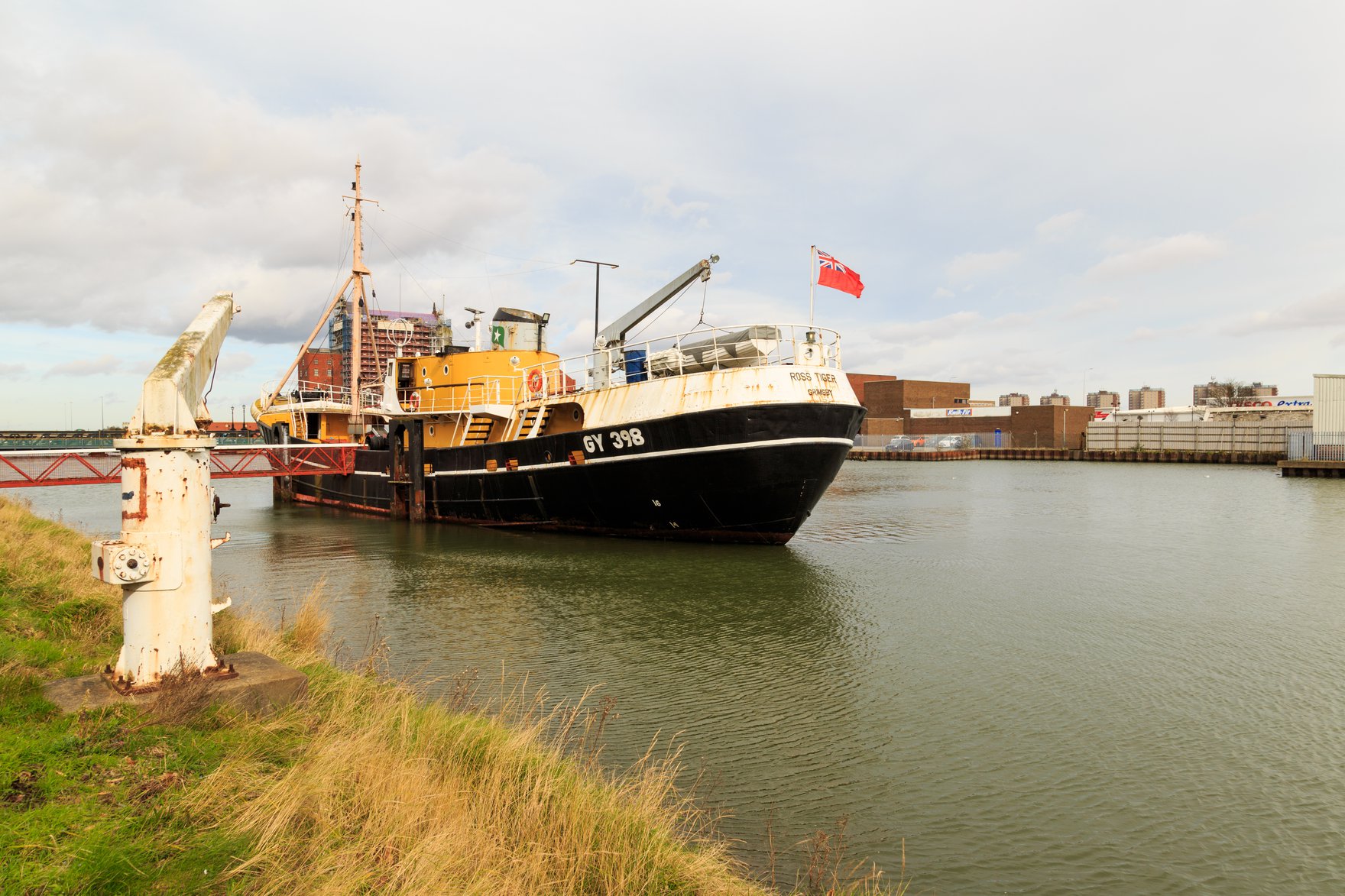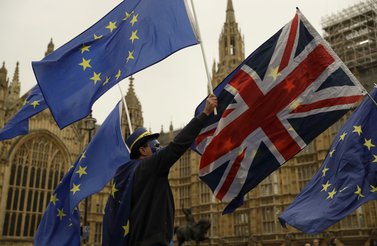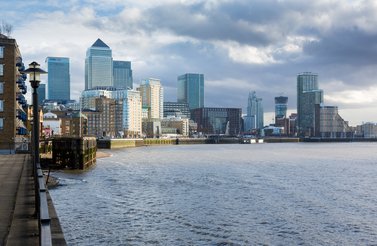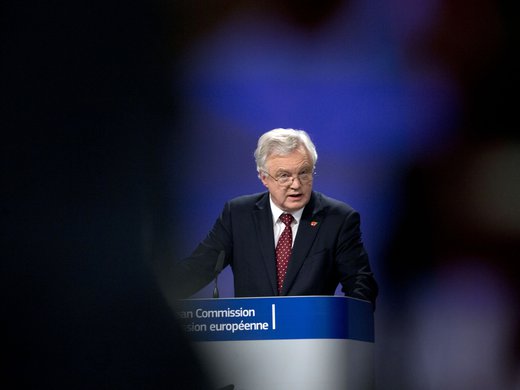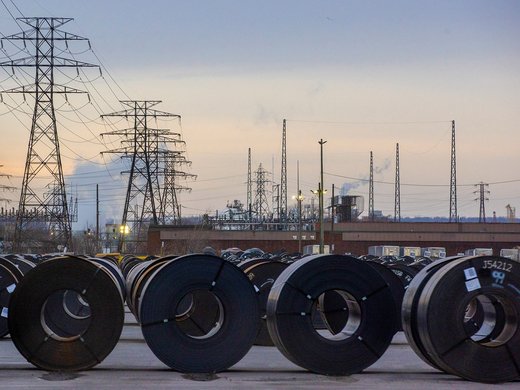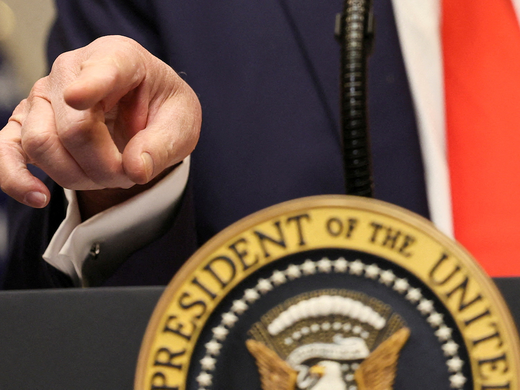They say that when Grimsby’s fishing industry was at its peak, if you lined up every trawler from the docks, you would be able to walk a mile out to sea. Today, that is a distant memory. After a long-term decline in fishing across the United Kingdom, there are just 20 trawlers left in Grimsby. Still, fish remains central to the identity of this port town, nestled in North East Lincolnshire. Photographs of Grimsby’s glory days, when it was home to the world’s largest fishing port, adorn the walls of local pubs. And when the local football team plays, fans shout out, “FISH!”
For years, fishermen across Britain have complained about regulations imposed by the European Union. The Common Fisheries Policy sets quotas for how much fish member states can catch in different waters. In order to avoid competition with foreign trawlers, British fishermen would need to gain control of UK fishing grounds.
“There is a narrative of betrayal going back to 1973 [when Britain joined the European Economic Community] that fishing was considered expendable,” says Barrie Deas, chief executive of the National Federation of Fishermen’s Organisations. “It tied us into this absolutely atrocious deal — a top-down, unsympathetic system.”
It should come as little surprise, then, that during the 2016 referendum over Britain’s European Union membership, fishing was a crucial issue in Grimsby. The Leave campaign organized a flotilla of boats across the Humber estuary, which swells across the east coast of northern England. The prominent Conservative politician and Leave supporter David Davis — now the secretary of state for exiting the European Union — visited the town and pledged: “If we leave the EU, we can help our industry recover, perhaps taking our cue from Iceland.”
This was a welcome message in Grimsby, where unemployment is above the national average, (5.8 percent of people claim unemployment benefits, compared with 3.3 percent nationally) and where one in every three working people earn less than the living wage.
Ultimately, 70 percent of Grimsby’s residents voted to leave the European Union. Of course, in Grimsby — as elsewhere in the country — the reasons people had for voting to leave were complex. Nonetheless, the idea of rescuing the fishing industry undoubtedly played a part. “Over the last 40 years, the economic benefits have gone with the quotas to Europe,” says Deas. “We want to see that redressed.”
On leaving the European Union, Britain will become an independent coastal state. However, the apparently clear narrative that Brexit will reinvigorate British fishing was undermined when a Grimsby-based business group hit the headlines in November. A regional lobby group, Seafood Grimsby and Humber, was campaigning to avoid tariffs, customs and other burdens that will come with departing the European Union. Simon Dwyer, a representative of the group, gave a presentation to members of Parliament (MPs) in which he argued for a free trade status for ports at Grimsby and nearby Immingham, which handle a lot of seafood.
This caught Britain’s attention: here, apparently, was a town that had overwhelmingly voted to leave the European Union, only to beg for special exception as soon as it was faced with the hard reality of Brexit. The story spread across the national press and went viral on social media, with the implication that Grimsby’s residents simply hadn’t understood what the vote would mean, wanting to limit immigration with no effect on trade. One headline in the Grimsby Telegraph read, “Grimsby residents branded ‘idiots’ for Brexit vote as seafood industry seeks free trade deal.”
In fact, the real story was more complicated. It wasn’t the pro-Brexit fishermen who were asking for a special exemption — it was seafood processors, who gut and package fish from all over the world. As traditional fishing has declined, this processing industry has thrived in Grimsby. Rather than standing empty and desolate, the docks where hundreds of fishing trawlers used to amass are now populated by 70 processing warehouses with more than 5,000 employees, as reported by the New York Times. This is an international industry. Not only is 80 percent of the fish handled here imported, but around one-third of the staff are foreign nationals, mostly from the eastern EU states Poland and Lithuania. Seafood processors argue that their arm of the industry is thriving, but that staying profitable without the free trade and movement of people that come with EU membership will be a challenge.
“We have a great history and heritage of fishing in Grimsby, which has led to where we are today,” says Martyn Boyers, chief executive of Grimsby’s fish market. “We don’t have anywhere near the number of fishing vessels we did in the 1950s or 1960s, but we are a really strong processing base. We’ve had to adapt the structure of our businesses to reflect changes in the fishing industry.” Boyers opposes the request for a special free trade status for the port, arguing that Britain’s domestic fishing industry must operate on a level playing field.
It’s unclear exactly what Britain — and its fishing industries — will look like after it leaves the European Union, even as the March 2020 deadline rapidly approaches. A government proposal on fisheries policy post-Brexit has been long delayed. But given drastic changes in the nature of the British fishing industry, there are question marks over how much difference leaving the Union will make. Some argue that nostalgia over fishing and Britain’s past triumphed over economic reality.
“In terms of the economy the fishing industry is very, very small,” says Boyers. “But its emotional significance is extremely high. There is huge support for fishermen across the UK. So much so that many people voted to opt out of Europe on the basis of protecting the fishing industry. That is great, if maybe slightly misguided. The level of emotion is completely disproportionate to the economic benefits that fishing can bring.”
To understand why fishing — an industry that accounts for less than half a percent of the British economy — played such a prominent role in the EU referendum campaign, it is vital to understand its emotional resonance. In Grimsby, there is a great deal of nostalgia for fishing — it might be rooted in the island’s long history as a seafaring nation, or in the heroic identity tied to deep-sea fishing, or maybe in the close-knit nature of fishing communities.
The industry sustains around 24,000 jobs in a population of 65 million, and just one-third of those are in fishing itself. The rest are all in processing, which is by far the more successful arm of the industry.
The British fishing industry went into decline long before the United Kingdom joined the European Union in 1992. It began during a series of confrontations between the United Kingdom and Iceland over fishing rights, which spanned the 1950s to the 1970s. The upshot was that Britain was expelled from Icelandic waters in 1976. When the European Union’s Common Fisheries Policy came into action, the quotas were loosely based on how much states fished in different areas in the 1970s. At this point, British fleets had mostly fished around Iceland, which is not part of the European Union. This resulted in some skewed quotas. Barrie Deas pointed to English Channel cod as an example; Britain has just nine percent of the quota, while France has 84 percent.
In Grimsby, as in other fishing towns, the EU Common Fisheries Policy and the British government’s management of quotas and grants have been blamed for the industry’s drastic decline. Some factors are outside the realm of policy — according to environmentalists, fish are moving north, out of British waters, due to climate change. “I’m a realist enough to think you’re not going to turn the clock back to 1973 and have the ports and fleets you had then — but there ought to be additional fishing opportunities and a process of rebalancing,” says Deas.
The fish market that Boyers runs operates much as it has for generations. Merchants gather around boxes of fish at an early morning auction. Still one of the most important fish markets in Europe, it handles around 20,000 tonnes of fresh fish a year — the vast majority of which is imported. In 2016, just 31 UK boats landed fish or shellfish at Grimsby.
“People seem to think that after we leave the EU, we’re going to get back a load of boats in Grimsby — and I don’t think that’s going to happen,” says Boyers. “I’m not optimistic in that sense, though I am optimistic that going forward we can create a level playing field in trade with our partners.” The United Kingdom’s main trading partners for fish are Iceland and Norway, neither of which is a member of the European Union.
Earlier this year, it was announced that Britain would remain part of the Common Fisheries Policy until 2020, a decision that prompted outrage among some in Grimsby. The policy leaves Britain subject to the rules that many fisherman object to, but without a voice at the negotiating table when quotas are decided. The Labour MP for Greater Grimsby, Melanie Onn, said that this transition deal would be a “total sell-out.”
The decision is part of a painful realization that Brexit might not provide the total reinvigoration of the fishing industry that had been promised. In March, a Grimsby Telegraph headline read, “Fishing after Brexit will bring ‘dozens, not hundreds’ of jobs to Grimsby.”
For now, the residents of Grimsby and other fishing towns can only wait. “It’s a totemic or emblematic issue for Brexit,” says Deas. “It’ll take years, decades before you really know what Brexit will mean, but you’ll know from day one whether fishing has a good deal or not.”
